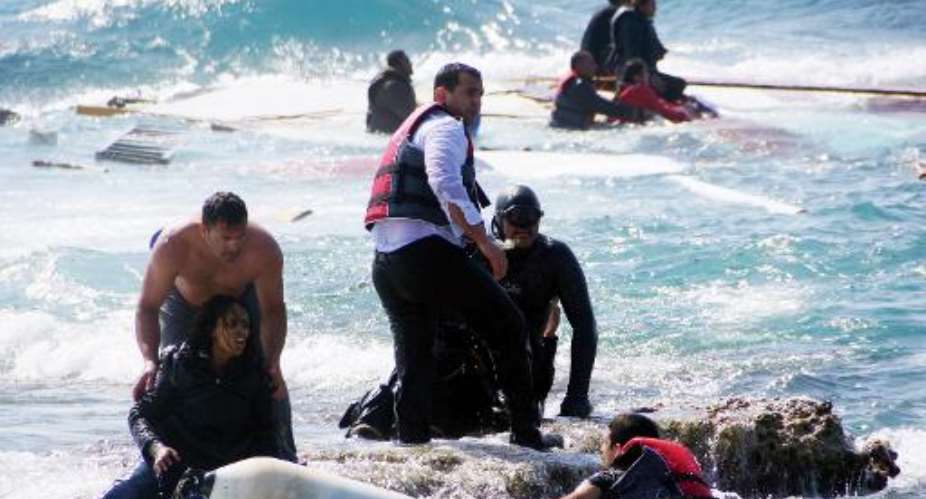Geneva (AFP) - Surging numbers of migrants risking their lives on rickety boats both in Southeast Asia and on the way to Europe are a test of the world's humanity, the Red Cross chief told AFP in an interview.
"The tolerance, the generosity, the openness, the solidarity of the world will be tested," said Elhadj As Sy, head of the International Federation of Red Cross and Red Crescent Societies (IFRC).
"Simply put our humanity will be tested. The question is, will we pass the test?" he told AFP in his office in Geneva this week, after a visit to Asia, where he took part in a summit on migration.
Nearly 3,000 migrants have swum to shore or been rescued off Malaysia, Indonesia and Thailand over the past 10 days after a Thai crackdown on human-trafficking threw the illicit trade into chaos, with some of the syndicates involved abandoning their helpless human cargo at sea.
Malaysia on Thursday ordered search and rescue missions for the thousands more believed to be stranded at sea, in the first proactive official move in the region aimed at saving the boatpeople.
And Malaysia and Indonesia have said they will end a much-condemned policy of turning away boatloads of starving Muslim Rohingya fleeing from Myanmar, and economic migrants from Bangladesh.
"We are pleased to witness that so many people from Myanmar and Bangladesh are being hosted... while longer term solutions to this problem are being found," Sy said, adding that next time "we hope it will not take so long for that to happen."
More than 88,000 people have attempted the dangerous sea voyage across the Bay of Bengal and Andaman Sea since 2014, including more than 25,000 so far this year, according to UN numbers.
Nearly 1,000 are believed to have died at sea during that period due to precarious conditions, and an equal number from mistreatment at the hands of traffickers and abusive smugglers.
"The hygienic conditions on such boats are horrible... Women get abused... Children witness horrific things that they should never see in their entire lives. And you know men are reduced to their minimum, unable to defend their families," Sy said.
Red Cross and Red Crescent workers were doing their best to help, providing food, water and shelter, but also just extending "a friendly hand" to help people to "recover some sense of humanity and dignity," he said.
- Show more generosity -
Sy added it was paramount to address "the situations that are really pushing people out," like the Myanmar government's treatment of its Rohingya minority.
The migrant crisis in South East Asia has ballooned at a time when Europe too is reeling from a flood of migrants risking their lives on the Mediterranean to reach its shores.
More than 5,000 people have died in the past 18 months while trying to make the dangerous crossing in flimsy dinghies and fishing boats.
The European Union agreed this week on an unprecedented naval mission starting next month to fight the human traffickers behind the deluge of migrants and refugees attempting the crossing from chaos-wracked Libya.
While acknowledging that "all the criminal activities around people that would exacerbate their vulnerabilities and their risks (must) of course be handled," Sy stressed that in both Southeast Asia and Europe the main focus should be on saving lives.
"We are not in the business of destroying boats but we are in the business of how we can care for the migrants," he said.
He called for known migrant routes to be "secured" with search and rescue teams and for destination countries to have apparatuses in place to care for them when they arrive.
"Our expectation is that (they) show more generosity and humanity," he said.
"There is a humanitarian imperative to care for people who are searching for peace, who are searching for better conditions... and nothing less is expected from Europe," he said, when asked about a controversial plan for European country quotas for refugees cross the Mediterranean.
In the long term, he said, countries need to open up legal and safe means of migration, "so that the room for traffickers and smugglers gets more and more reduced."





 Meta releases new version of conversational AI across its platforms
Meta releases new version of conversational AI across its platforms
 Cape Town named Africa’s Best Airport 2024 by Skytrax
Cape Town named Africa’s Best Airport 2024 by Skytrax
 Bono East: Four injured after hearse transporting corpse crashes into a truck
Bono East: Four injured after hearse transporting corpse crashes into a truck
 ‘Be courageous, find your voice to defend our democracy’ — Sam Jonah urges journ...
‘Be courageous, find your voice to defend our democracy’ — Sam Jonah urges journ...
 Exodus of doctors, nurses and teachers have worsened because of unserious Akufo-...
Exodus of doctors, nurses and teachers have worsened because of unserious Akufo-...
 2024 election: Avoid insults, cutting down people in search of power – National ...
2024 election: Avoid insults, cutting down people in search of power – National ...
 ‘You passed through the back door but congratulations’ — Atubiga on Prof Jane Na...
‘You passed through the back door but congratulations’ — Atubiga on Prof Jane Na...
 Government’s $21.1 billion added to the stock of public debt has been spent judi...
Government’s $21.1 billion added to the stock of public debt has been spent judi...
 Akufo-Addo will soon relocate Mahama’s Ridge Hospital to Kumasi for recommission...
Akufo-Addo will soon relocate Mahama’s Ridge Hospital to Kumasi for recommission...
 We must not compromise on our defence of national interest; this is the time to ...
We must not compromise on our defence of national interest; this is the time to ...
